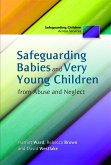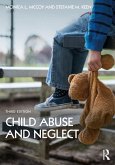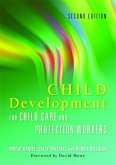Tackling Child Neglect
Research, Policy and Evidence-Based Practice
Herausgeber: Gardner, Ruth
Tackling Child Neglect
Research, Policy and Evidence-Based Practice
Herausgeber: Gardner, Ruth
- Broschiertes Buch
- Merkliste
- Auf die Merkliste
- Bewerten Bewerten
- Teilen
- Produkt teilen
- Produkterinnerung
- Produkterinnerung
Neglect is the most common form of child abuse, but is hard to identify and address. In this book, expert contributors provide the latest thinking on the theory, research and practice surrounding child neglect. It includes illustrative examples to demonstrate the impact of neglect on families and shows how change can be achieved.
Andere Kunden interessierten sich auch für
![Child Neglect Child Neglect]() Child Neglect51,99 €
Child Neglect51,99 €![Safeguarding Babies and Very Young Children from Abuse and Neglect Safeguarding Babies and Very Young Children from Abuse and Neglect]() Rebecca BrownSafeguarding Babies and Very Young Children from Abuse and Neglect48,99 €
Rebecca BrownSafeguarding Babies and Very Young Children from Abuse and Neglect48,99 €![Child Abuse and Neglect Child Abuse and Neglect]() Monica L. McCoy (Converse College, South Carolina, USA)Child Abuse and Neglect139,99 €
Monica L. McCoy (Converse College, South Carolina, USA)Child Abuse and Neglect139,99 €![The Development of Child Protection Systems and Practice in Low- To Middle-Income Countries The Development of Child Protection Systems and Practice in Low- To Middle-Income Countries]() The Development of Child Protection Systems and Practice in Low- To Middle-Income Countries141,99 €
The Development of Child Protection Systems and Practice in Low- To Middle-Income Countries141,99 €![The Child's World, Third Edition The Child's World, Third Edition]() The Child's World, Third Edition50,99 €
The Child's World, Third Edition50,99 €![Child Development for Child Care and Protection Workers Child Development for Child Care and Protection Workers]() Brigid DanielChild Development for Child Care and Protection Workers41,99 €
Brigid DanielChild Development for Child Care and Protection Workers41,99 €![The Saddest Girl in the World The Saddest Girl in the World]() Cathy GlassThe Saddest Girl in the World17,99 €
Cathy GlassThe Saddest Girl in the World17,99 €-
-
-
Neglect is the most common form of child abuse, but is hard to identify and address. In this book, expert contributors provide the latest thinking on the theory, research and practice surrounding child neglect. It includes illustrative examples to demonstrate the impact of neglect on families and shows how change can be achieved.
Produktdetails
- Produktdetails
- Verlag: Jessica Kingsley Publishers
- Seitenzahl: 368
- Erscheinungstermin: 18. August 2016
- Englisch
- Abmessung: 229mm x 150mm x 20mm
- Gewicht: 538g
- ISBN-13: 9781849056625
- ISBN-10: 1849056625
- Artikelnr.: 42788675
- Herstellerkennzeichnung
- Libri GmbH
- Europaallee 1
- 36244 Bad Hersfeld
- gpsr@libri.de
- Verlag: Jessica Kingsley Publishers
- Seitenzahl: 368
- Erscheinungstermin: 18. August 2016
- Englisch
- Abmessung: 229mm x 150mm x 20mm
- Gewicht: 538g
- ISBN-13: 9781849056625
- ISBN-10: 1849056625
- Artikelnr.: 42788675
- Herstellerkennzeichnung
- Libri GmbH
- Europaallee 1
- 36244 Bad Hersfeld
- gpsr@libri.de
Edited by Ruth Gardner. Foreword by David Howe
Introduction. Ruth Gardner
University of East Anglia and NSPCC
UK. Part 1: The effects of child neglect: Understanding and responding. 1: The effects of emotional neglect in the first two years of life. Jane Barlow
Warwick Medical School
University of Warwick
UK. 2: Child neglect and the development of communication. Jan McAllister
University of East Anglia
UK and Wendy Lee
The Communication Trust
UK. 3: Making a difference to the neglected child's lived experience. Jan Horwath
Sheffield University
UK. Part Two: Perspectives on child neglect. 4: Child neglect
the research landscape. Debra Allnock
University of Bedfordshire
UK. 5: Learning from children and young people about neglect. Sarah Gorin
Consultant Researcher
UK. 6: General Practitioners' responses to child neglect. Jenny Woodman
General Practitioner
UK. 7: Responding to child neglect: Learning from Serious Case Reviews. Marian Brandon and Pippa Belderson
University of East Anglia
UK. Part Three: Preventing and reversing child neglect: An international picture. 8: 'What happens?' and 'what works?' with Sign of Safety. Amanda Bunn
Freelance Research Consultant and Practitioner
UK
Leigh Taylor
Senior Practitioner
Edinburgh
UK
Dan Koziolek
Carver County Community Social Services (CCCSS)
Minnesota
USA and Andrew Turnell
Director
Signs of Safety ®
Australia. 9: Practices targeting child neglect: The use of SafeCare® to enhance parenting skills to reduce neglect. Whitney L. Rostad
Mark Chaffin Center for Healthy Development
Georgia State University
USA
John R. Lutzker
Director
Georgia State University
Atlanta
USA and Katelyn M. Guastaferro
The Mark Chaffin Center for Healthy Development
School of Public Health
Georgia State University
USA. With a note on the UK evaluation of SafeCare by Gillian Churchill. 10: Video Interaction Guidance: Providing an effective response for neglected children. Hilary Kennedy
Director
Video Interaction Guidance
UK
Maeve Macdonald
Educational Psychologist and Paul Whalley
NSPCC
UK.
University of East Anglia and NSPCC
UK. Part 1: The effects of child neglect: Understanding and responding. 1: The effects of emotional neglect in the first two years of life. Jane Barlow
Warwick Medical School
University of Warwick
UK. 2: Child neglect and the development of communication. Jan McAllister
University of East Anglia
UK and Wendy Lee
The Communication Trust
UK. 3: Making a difference to the neglected child's lived experience. Jan Horwath
Sheffield University
UK. Part Two: Perspectives on child neglect. 4: Child neglect
the research landscape. Debra Allnock
University of Bedfordshire
UK. 5: Learning from children and young people about neglect. Sarah Gorin
Consultant Researcher
UK. 6: General Practitioners' responses to child neglect. Jenny Woodman
General Practitioner
UK. 7: Responding to child neglect: Learning from Serious Case Reviews. Marian Brandon and Pippa Belderson
University of East Anglia
UK. Part Three: Preventing and reversing child neglect: An international picture. 8: 'What happens?' and 'what works?' with Sign of Safety. Amanda Bunn
Freelance Research Consultant and Practitioner
UK
Leigh Taylor
Senior Practitioner
Edinburgh
UK
Dan Koziolek
Carver County Community Social Services (CCCSS)
Minnesota
USA and Andrew Turnell
Director
Signs of Safety ®
Australia. 9: Practices targeting child neglect: The use of SafeCare® to enhance parenting skills to reduce neglect. Whitney L. Rostad
Mark Chaffin Center for Healthy Development
Georgia State University
USA
John R. Lutzker
Director
Georgia State University
Atlanta
USA and Katelyn M. Guastaferro
The Mark Chaffin Center for Healthy Development
School of Public Health
Georgia State University
USA. With a note on the UK evaluation of SafeCare by Gillian Churchill. 10: Video Interaction Guidance: Providing an effective response for neglected children. Hilary Kennedy
Director
Video Interaction Guidance
UK
Maeve Macdonald
Educational Psychologist and Paul Whalley
NSPCC
UK.
Introduction. Ruth Gardner
University of East Anglia and NSPCC
UK. Part 1: The effects of child neglect: Understanding and responding. 1: The effects of emotional neglect in the first two years of life. Jane Barlow
Warwick Medical School
University of Warwick
UK. 2: Child neglect and the development of communication. Jan McAllister
University of East Anglia
UK and Wendy Lee
The Communication Trust
UK. 3: Making a difference to the neglected child's lived experience. Jan Horwath
Sheffield University
UK. Part Two: Perspectives on child neglect. 4: Child neglect
the research landscape. Debra Allnock
University of Bedfordshire
UK. 5: Learning from children and young people about neglect. Sarah Gorin
Consultant Researcher
UK. 6: General Practitioners' responses to child neglect. Jenny Woodman
General Practitioner
UK. 7: Responding to child neglect: Learning from Serious Case Reviews. Marian Brandon and Pippa Belderson
University of East Anglia
UK. Part Three: Preventing and reversing child neglect: An international picture. 8: 'What happens?' and 'what works?' with Sign of Safety. Amanda Bunn
Freelance Research Consultant and Practitioner
UK
Leigh Taylor
Senior Practitioner
Edinburgh
UK
Dan Koziolek
Carver County Community Social Services (CCCSS)
Minnesota
USA and Andrew Turnell
Director
Signs of Safety ®
Australia. 9: Practices targeting child neglect: The use of SafeCare® to enhance parenting skills to reduce neglect. Whitney L. Rostad
Mark Chaffin Center for Healthy Development
Georgia State University
USA
John R. Lutzker
Director
Georgia State University
Atlanta
USA and Katelyn M. Guastaferro
The Mark Chaffin Center for Healthy Development
School of Public Health
Georgia State University
USA. With a note on the UK evaluation of SafeCare by Gillian Churchill. 10: Video Interaction Guidance: Providing an effective response for neglected children. Hilary Kennedy
Director
Video Interaction Guidance
UK
Maeve Macdonald
Educational Psychologist and Paul Whalley
NSPCC
UK.
University of East Anglia and NSPCC
UK. Part 1: The effects of child neglect: Understanding and responding. 1: The effects of emotional neglect in the first two years of life. Jane Barlow
Warwick Medical School
University of Warwick
UK. 2: Child neglect and the development of communication. Jan McAllister
University of East Anglia
UK and Wendy Lee
The Communication Trust
UK. 3: Making a difference to the neglected child's lived experience. Jan Horwath
Sheffield University
UK. Part Two: Perspectives on child neglect. 4: Child neglect
the research landscape. Debra Allnock
University of Bedfordshire
UK. 5: Learning from children and young people about neglect. Sarah Gorin
Consultant Researcher
UK. 6: General Practitioners' responses to child neglect. Jenny Woodman
General Practitioner
UK. 7: Responding to child neglect: Learning from Serious Case Reviews. Marian Brandon and Pippa Belderson
University of East Anglia
UK. Part Three: Preventing and reversing child neglect: An international picture. 8: 'What happens?' and 'what works?' with Sign of Safety. Amanda Bunn
Freelance Research Consultant and Practitioner
UK
Leigh Taylor
Senior Practitioner
Edinburgh
UK
Dan Koziolek
Carver County Community Social Services (CCCSS)
Minnesota
USA and Andrew Turnell
Director
Signs of Safety ®
Australia. 9: Practices targeting child neglect: The use of SafeCare® to enhance parenting skills to reduce neglect. Whitney L. Rostad
Mark Chaffin Center for Healthy Development
Georgia State University
USA
John R. Lutzker
Director
Georgia State University
Atlanta
USA and Katelyn M. Guastaferro
The Mark Chaffin Center for Healthy Development
School of Public Health
Georgia State University
USA. With a note on the UK evaluation of SafeCare by Gillian Churchill. 10: Video Interaction Guidance: Providing an effective response for neglected children. Hilary Kennedy
Director
Video Interaction Guidance
UK
Maeve Macdonald
Educational Psychologist and Paul Whalley
NSPCC
UK.








